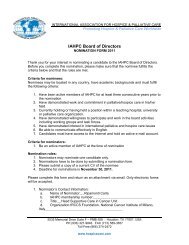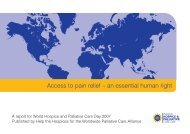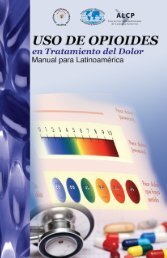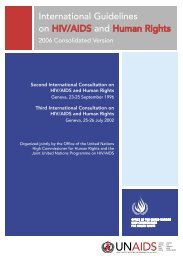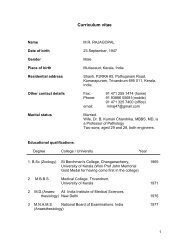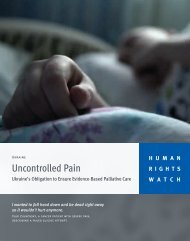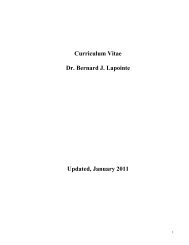INTERIGHTS Bulletin
INTERIGHTS Bulletin
INTERIGHTS Bulletin
You also want an ePaper? Increase the reach of your titles
YUMPU automatically turns print PDFs into web optimized ePapers that Google loves.
186<br />
<strong>INTERIGHTS</strong> <strong>Bulletin</strong><br />
Volume 16 Number 4 2011<br />
also called for ensuring affordable<br />
access to adequate emergency obstetric<br />
care; providing adequate training for<br />
health workers and imposing<br />
sanctions on health professionals who<br />
violate women’s reproductive rights;<br />
ensuring that private healthcare<br />
facilities comply with national and<br />
international reproductive healthcare<br />
standards; and ensuring access to<br />
effective remedies for reproductive<br />
rights violations. 11<br />
Abortion Jurisprudence<br />
Because abortion is often subject to<br />
legal and procedural restrictions,<br />
heavily stigmatised and highly timesensitive,<br />
violations in the abortion<br />
context are frequent. In the process of<br />
protecting access to safe and legal<br />
abortion, a growing body of<br />
jurisprudence is articulating how<br />
denial of medical treatment violates<br />
fundamental rights and that states are<br />
obligated to institute procedural<br />
protections to prevent these violations.<br />
Denial of Key Medical Services and<br />
Information as Cruel, Inhuman and<br />
Degrading Treatment<br />
In its groundbreaking 2005 decision,<br />
KL v Peru, the Human Rights<br />
Committee, which oversees<br />
compliance with the International<br />
Covenant on Civil and Political Rights,<br />
held that denial of a therapeutic<br />
abortion violates the right to be free<br />
from torture, cruel, inhuman and<br />
degrading treatment. 12 It noted that<br />
Article 7 ‘relates not only to physical<br />
pain but also to mental suffering’ 13 and<br />
that KL’s suffering was foreseeable. 14<br />
In 2011, the European Court found in<br />
RR v Poland 15 that denial of essential<br />
medical information in the abortion<br />
context can violate the right to be free<br />
from cruel, inhuman and degrading<br />
treatment. While the decision is not yet<br />
final as Poland has appealed to the<br />
Grand Chamber, the reasoning in the<br />
case is instructive. RR was consistently<br />
denied the genetic testing she needed<br />
to make an informed decision about<br />
whether to terminate her pregnancy<br />
and to demonstrate that she qualified<br />
for a legal abortion under Poland’s<br />
highly restrictive abortion law. RR’s<br />
doctors denied the testing precisely<br />
because they believed RR would use<br />
the information to terminate her<br />
pregnancy. By the time RR received<br />
confirmation of the foetal anomaly, it<br />
was too late for her to obtain an<br />
abortion. The European Court rejected<br />
the Polish Government’s claim that<br />
RR’s doctors were entitled to refuse to<br />
provide these services on the grounds<br />
of conscience, affirming that states are<br />
obligated to organise their health<br />
services ‘to ensure that an effective<br />
exercise of the freedom of conscience<br />
of health professionals...does not<br />
prevent patients from obtaining access<br />
to [legal healthcare] services...’ 16<br />
In concluding that RR had been<br />
subjected to inhuman and degrading<br />
treatment, the European Court<br />
analysed the relationship between<br />
access to reliable medical information<br />
and RR’s ability to exercise her right to<br />
a legal abortion, and the mistreatment<br />
RR experienced at the hands of her<br />
healthcare providers. The Court noted<br />
that it has found violations of Article 3<br />
where authorities showed ‘a callous<br />
disregard for [the] vulnerability and<br />
distress’ seeking ‘information of<br />
crucial importance’ to the applicants. 17<br />
The Court recognised RR’s<br />
vulnerability and ‘acute anguish’<br />
caused by her inability to obtain<br />
accurate information about her<br />
pregnancy and that the health<br />
professionals treating RR did not take<br />
into account ‘the temporal aspect of<br />
the applicant’s predicament’ or<br />
acknowledge or address her<br />
concerns. 18 It noted that RR was<br />
‘shabbily treated by the doctors dealing<br />
with her case’ who criticised and<br />
belittled her for considering<br />
terminating the pregnancy and that RR<br />
had been ‘humiliated.’ 19<br />
Meaningful Procedural Protections<br />
and Timely Remedies<br />
Access to abortion is highly timesensitive<br />
because of the nature of<br />
pregnancy, but there are many situations<br />
where medical information and<br />
treatment must be provided in a timely<br />
fashion to protect a patient’s rights and<br />
to prevent lasting harm. In those<br />
instances,<br />
abortion-related<br />
jurisprudence affirming the importance<br />
of procedural protections and timely<br />
remedies could be applicable.<br />
In determining exhaustion of domestic<br />
remedies in KL v Peru, the Human<br />
Rights Committee noted that<br />
meaningful remedies had to be<br />
attuned to the time-sensitive nature of<br />
terminating a pregnancy and<br />
remarked on the absence of an<br />
‘administrative remedy which would<br />
enable a pregnancy to be terminated<br />
on therapeutic grounds, or any judicial<br />
remedy functioning with the speed<br />
and efficiency required to enable a<br />
woman to require the authorities to<br />
guarantee her right to lawful abortion<br />
within the limited period...’ 20<br />
Similarly, in Tysiac v Poland, another<br />
European Court decision involving the<br />
denial of a legal abortion in Poland, the<br />
Court emphasised the importance of<br />
clearly defined procedures to ensure<br />
that healthcare providers can perform<br />
abortions without fear of legal<br />
penalties and to ensure that redress<br />
procedures are in place for women<br />
who have been denied an abortion. 21<br />
The European Court recognised the<br />
‘chilling effect’ that largely<br />
criminalising a medical procedure can<br />
have on its provision and stated that:<br />
‘The provisions regulating the<br />
availability of legal abortion should be<br />
formulated in such a way to alleviate<br />
this effect. Once the legislature decides<br />
to allow abortion, it must not structure<br />
its legal framework in a way which<br />
would limit real possibilities to obtain<br />
it.’ 22 The European Court noted that<br />
‘the concepts of lawfulness and the<br />
rule of law in a democratic society<br />
command that measures affecting<br />
fundamental human rights be, in<br />
certain cases, subject to some form of<br />
procedure before an independent<br />
body....’ 23 In such instances, the<br />
procedure should at a minimum<br />
provide the pregnant woman with a<br />
chance ‘to be heard in person and to<br />
have her views considered.’ 24 The<br />
relevant body ‘should also issue<br />
written grounds for its decision.’ The<br />
importance of these procedural



